Well, I had task to create function that does Fourier series with some mathematical function, so I found all the formulas, but the main problem is when I change count of point on some interval to draw those series I have very strange artifact:
This is Fourier series of sin(x) on interavl (-3.14; 314) with 100 point for tabulation

And this is same function with same interval but with 100000 points for tabulation
Code for Fourier series coeficients:
void fourieSeriesDecompose(std::function<double(double)> func, double period, long int iterations, double *&aParams, double *&bParams){
aParams = new double[iterations];
aParams[0] = integrateRiemans(func, 0, period, 1000);
for(int i = 1; i < iterations; i++){
auto sineFunc = [&](double x) -> double { return 2 * (func(x) * cos((2 * x * i * M_PI) / period)); };
aParams[i] = integrateRiemans(sineFunc, -period / 2, period / 2, 1000) / period;
}
bParams = new double[iterations];
for(int i = 1; i < iterations; i++){
auto sineFunc = [&](double x) -> double { return 2 * (func(x) * sin(2 * (x * (i + 1) * M_PI) / period)); };
bParams[i] = integrateRiemans(sineFunc, -period / 2, period / 2, 1000) / period;
}
}
This code I use to reproduce function using found coeficients:
double fourieSeriesCompose(double x, double period, long iterations, double *aParams, double *bParams){
double y = aParams[0];
for(int i = 1; i < iterations; i++){
y += sqrt(aParams[i] * aParams[i] + bParams[i] * bParams[i]) * cos((2 * i * x * M_PI) / period - atan(bParams[i] / aParams[i]));
}
return y;
}
And the runner code
double period = M_PI * 2;
auto startFunc = [](double x) -> double{ return sin(x); };
fourieSeriesDecompose(*startFunc, period, 1000, aCoeficients, bCoeficients);
auto readyFunc = [&](double x) -> double{ return fourieSeriesCompose(x, period, 1000, aCoeficients, bCoeficients); };
tabulateFunc(readyFunc);
scaleFunc();
//Draw methods after this